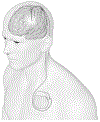Do Relational and Self-Definitional Traits Influence Deep Brain Stimulation Device Preference?
- PMID: 33767530
- PMCID: PMC7989068
- DOI: 10.1037/pap0000249
Do Relational and Self-Definitional Traits Influence Deep Brain Stimulation Device Preference?
Abstract
Personality psychodynamics have been shown to influence individual responses to psychiatric treatments, including medication. Increasingly, neuromodulation therapies have become available for severe and treatment-resistant depression. This study aims to evaluate patient response to an implanted neurostimulator battery within the framework of relational versus self-definitional personality traits. Relational development is interpersonally oriented and disruptions along this pathway lead to dependency on others for a sense of security and self-worth. Self-definitional development is characterized by autonomy strivings and disruptions lead to self-critical feelings of failing to meet expectations. Patients drawn from a larger study of deep brain stimulation (DBS) for treatment-resistant depression were switched from a non-rechargeable to a rechargeable battery type to maintain stimulation therapy. This switch entailed taking greater personal responsibility for device maintenance and allowed for fewer battery replacement surgeries. Twenty-six patients completed the Depressive Experiences Questionnaire (DEQ) and a questionnaire surveying their preference for DBS battery type. Results show that the DEQ dependency subscale, and more specifically the neediness component of the subscale, is associated with patient preference for the non-rechargeable battery. This suggests that individuals with higher relational needs prefer treatment options that increase contact with and need for medical caregivers and may prioritize this aspect of an intervention over alternative considerations. In contrast, individuals with more self-critical personality traits did not have a battery type preference, indicating that self-definitional needs were not predictive of battery preference. The link between an individual's personality psychodynamics and response to biomedical interventions, including neuromodulation and treatments that incorporate medical devices, deserves further attention.
Keywords: anaclitic; deep brain stimulation; depression; introjective; object relations; relational; self-definitional.
Figures

Similar articles
-
[Validation study of the Depressive Experience Questionnaire].Encephale. 2003 Sep-Oct;29(5):445-55. Encephale. 2003. PMID: 14615694 French.
-
Fixed-Life or Rechargeable Battery for Deep Brain Stimulation: Preference and Satisfaction in Chinese Patients With Parkinson's Disease.Front Neurol. 2021 Jun 15;12:668322. doi: 10.3389/fneur.2021.668322. eCollection 2021. Front Neurol. 2021. PMID: 34211431 Free PMC article.
-
Quality of Internalized Object Representations and Suicidality in Individuals With Anaclitic and Introjective Personality Styles.J Pers Disord. 2021 Feb;35(1):145-160. doi: 10.1521/pedi_2019_33_435. Epub 2019 May 14. J Pers Disord. 2021. PMID: 31084554
-
The Depressive Experiences Questionnaire: a critical review.J Pers Assess. 1990 Fall;55(1-2):52-64. doi: 10.1080/00223891.1990.9674046. J Pers Assess. 1990. PMID: 2231259 Review.
-
Recommendations for Deep Brain Stimulation Device Management During a Pandemic.J Parkinsons Dis. 2020;10(3):903-910. doi: 10.3233/JPD-202072. J Parkinsons Dis. 2020. PMID: 32333552 Free PMC article. Review.
References
-
- Bacchiochi JR, Bagby RM, Cristi C, & Watson J (2003). Validation of connectedness and neediness as dimensions of the dependency construct. Cognitive Therapy and Research,27, 233–242. doi: 10.1023/A:1023517511152 - DOI
-
- Blatt SJ (1974). Levels of object representation in anaclitic and introjective depression. The psychoanalytic study of the child,29(1), 107–157. - PubMed
-
- Blatt SJ (1992). Interpersonal relatedness and self-definition: Two prototypes for depression.Clinical Psychology Review,12, 527–562. doi: 10.1016/0272-7358(92)90070-O - DOI
Grants and funding
LinkOut - more resources
Full Text Sources
